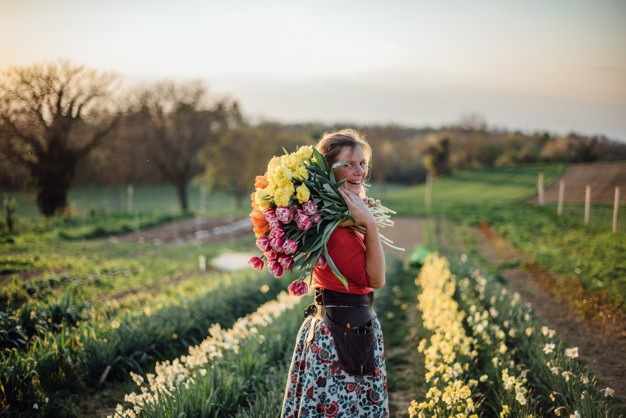Malin Lüth originally comes from the vegetable sector. Near Freiburg, between the Black Forest and the Vosges Mountains in the border triangle, she has been cultivating cut flowers sustainably and pesticide-free on her small field since 2019 and co-founded the Slowflower movement in Germany. "With vegetables, I've always been amazed at the beauty of how a carrot or a lettuce can bloom."
Slowflower movement in Germany
"Via an article in a magazine, I read that you can make a living from growing flowers. That's when I thought; I'd like to give that a shot, too." Inspiration came via social media and through the sustainable flower movement in the U.S. - the Slowflower movement. Sustainable flower growing, Lüth says, is not yet as common as it is, for example, in clothing or food. In 2019, the German Slowflower movement started small and informal with 10 members; today, after almost four years, there are 208 in the now registered association.

Malin Lüth on her field. Foto: Marcia Friese
The path to modernization
Wildling Blumen: that means no pesticides and cultivation and harvesting in harmony with nature. In 2019 Malin Lüth put the first spring bloomers, and in 2020 she finally went into business for herself with her small company during the pandemic. "All my beforehand calculated sales channels were suddenly uncertain or even closed, restaurants, florists, etc. All the customers were totally cautious or bailed. That was a big challenge, but that led me into modernization." Ideas to ship the flowers then came through Malin Lüth's social media channel. "So without further ado, I set up a basic online store and was then able to ship the daffodils and tulips, anemones, and ranunculus. That's how I realized I could reach a lot of customers all over Germany who had already changed their minds about sustainable flowers."
"Now I'm starting my fourth growing season. In the beginning, I tried many varieties and adapted them to my soil conditions." In the future, there will also be peonies; Malin Lüth has planted 1,300 of them as the next source of income, "they always need a bit until they come into the harvest." Her concept for Wildling Blumen also includes offering different and, above all, special color variations, as with her dried flowers - for example, straw flowers in copper, rosé, and sun-bleached flowers.
Sustainable solutions
Approximately 130 different crops she has planted on her small 0.8 ha area. "Even if I lose a crop sometimes, I'm still in a good position because of the large number of crops. I recently had to replant 10 percent of the area because I had a couch grass problem that I underestimated," she says. To conquer that, Malin Lüth covered the area with silage film to smother the couch grass. "Noticeable is the loss, however, if you then have to rehabilitate an area after all."
The field is irrigated using an 8,000l tank for drip irrigation. Malin Lüth learned a lot from the drought summer of 2022. 2021 was a very wet year when she still did the cultivation with soil press pots. Now, she works with direct seeding to have more stable plants.
The field is fertilized with compost, which has already improved the water-holding capacity of the soil - loess soil, which already has good water-holding capacity by nature - compared to previous years. "This allows me to save water, which may be very beneficial in the future should water costs also increase." She has almost no energy costs due to the open-air cultivation; only in summer does she run a cold store in an old butcher shop, where she also has her small workshop. Malin Lüth has set up a special solution for surplus produce. "If there is ever anything left over, there is the possibility in my online store to donate to the project 'Aufblühen.' For people in retirement homes and for refugee women. It's a win-win situation - The customers donate an amount so that the delivery there etc., is paid for, and you can thus bring joy to people with flowers."
Wildling flowers: that means handwork
Their field is 100 percent hand-tended. That pays off: Wildling Blumen is certified organic, and next year it will be Demeter certified as well. The flower grower has five employees, including two Ukrainian refugees and one employee who helps with office work. In addition to her cut flower production, Malin Lüth has built up other sources of income. These include events in the field: workshops with a floral designer together, start-up seminars, training on flower cultivation, and bachelorette parties. All of this takes place in a relaxed atmosphere on and around her field. Her mainstay is online shipping to direct customers. In addition, Wildling offers subscriber boxes with shipping in the region as well as flower delivery to florists, restaurants, and cafes. "Wildling is a small business, and I want to keep it small," Lüth says. "I love to work in the field, and if I were to grow my business any further, it wouldn't be possible to the same extent. Growing into other spheres, that's more my goal."
For more information:
Malin Lüth
Wildling Blumen
Römerstraße 2
79379 Müllheim
Tel.: +4915734385497
Email: info@wildlingblumen.de
www.wildlingblumen.de
Instagram: @wildling_blumen
